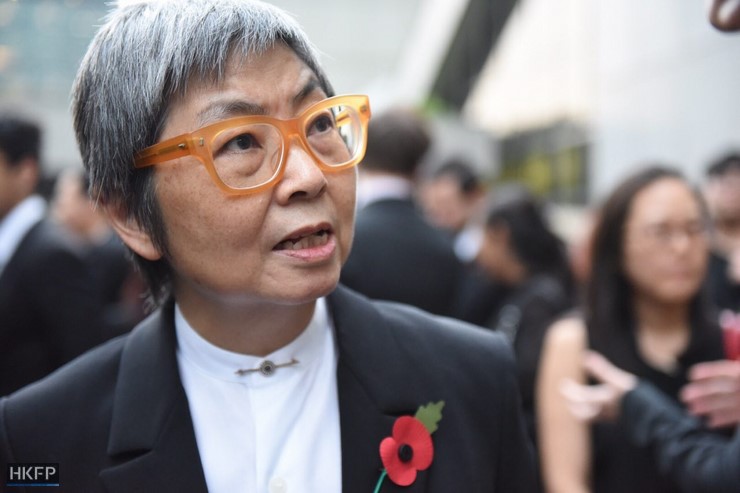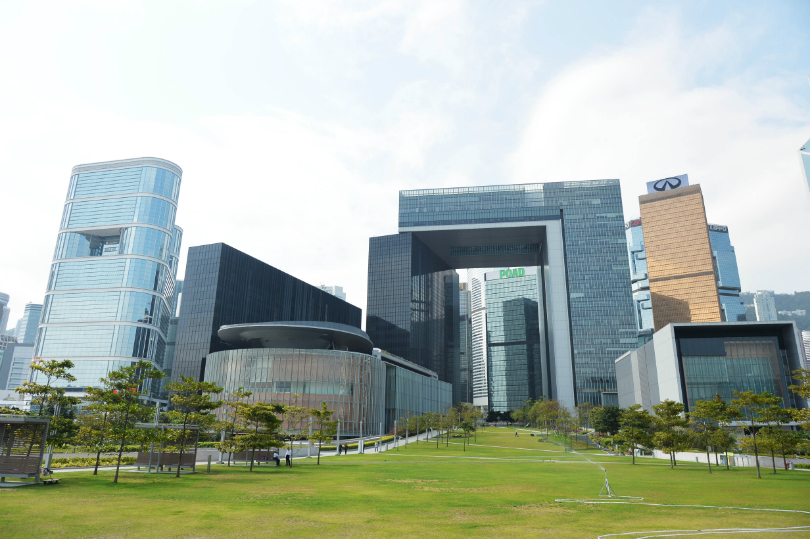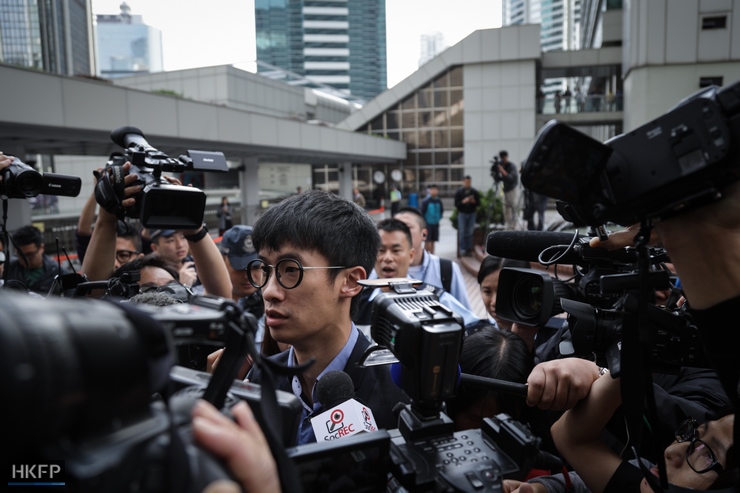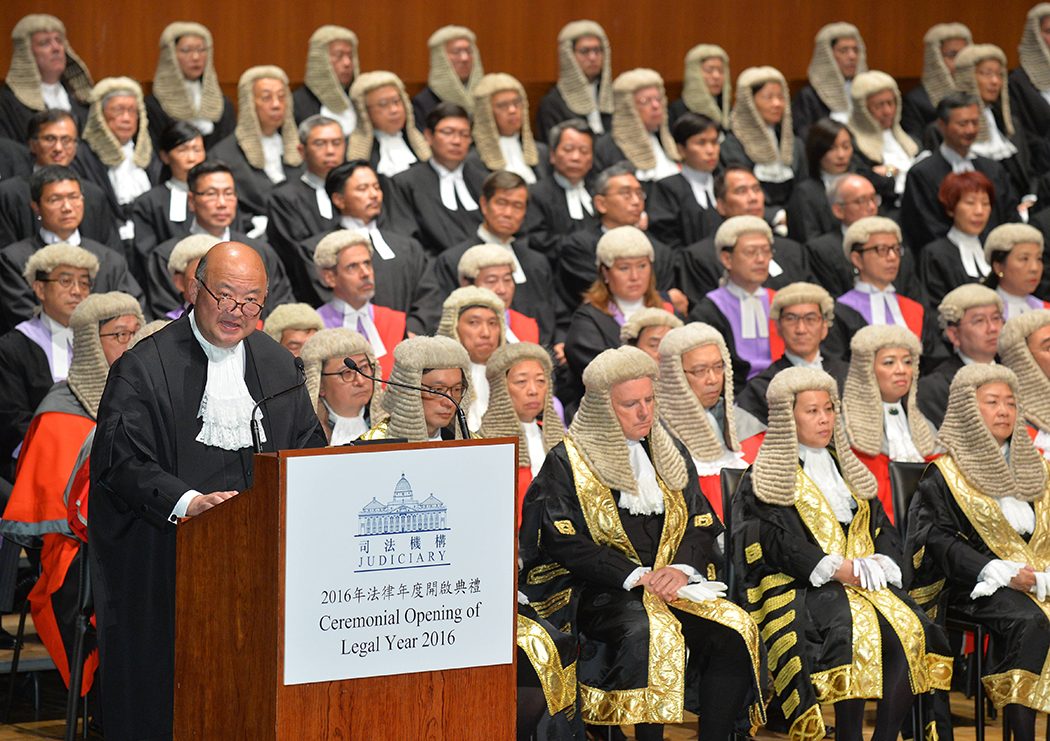Hong Kong’s courts could refuse to be bound by Beijing’s controversial ruling on the basis that it has violated multiple provisions of the Basic Law, barrister and former lawmaker Margaret Ng has suggested.
On Monday, China’s top legislature, the Standing Committee of the National People’s Congress (NPCSC), handed down a rare interpretation of Hong Kong’s mini-constitution in response to the oath controversy. The interpretation would effectively bar pro-independence politicians from becoming lawmakers. The legal profession has censured Beijing for damaging Hong Kong’s rule of law.

Violation of the Chinese Constitution
Hong Kong’s final appellate court has stated that Article 67(4) of the Chinese Constitution and Article 158(1) of the Basic Law gives the NPCSC a “freestanding and plenary power” of interpretation of the territory’s mini-constitution.
However, Ng wrote in Stand News on Wednesday that Beijing’s ruling had in fact contravened the two articles that provide the legal basis for an NPCSC interpretation.
In handing down Hong Kong’s first ever interpretation in 1999, the NPCSC said the Court of Final Appeal’s interpretation of a provision concerning the right of abode in the Basic Law did not reflect the legislative intent, thereby justifying Beijing’s action to clarify the law.
Ng argued that Monday’s interpretation of Article 104 did not touch upon the legislative intent; rather, Beijing itself said that it needed to fill the loopholes in the Basic Law and Hong Kong legislation. However, the NPCSC is not entitled to supplement Hong Kong’s laws, Ng said.

The NPCSC is only allowed to “partially supplement and amend” laws enacted by the National People’s Congress (NPC) under Article 67(3) of the Chinese Constitution. The NPC is allowed to amend the Basic Law through a formal procedure under Article 159, which has never been invoked since the 1997 handover.
“In all past instances of NPCSC interpretations, Beijing instead relied on Article 67(4), which does not include the power to supplement or amend national laws,” Ng wrote.
“Indisputably, the NPCSC’s interpretive power… cannot be used to supplement or amend the Basic Law, or it would amount to overstepping the rights of the NPC and thereby stripping the ‘interpretation’ of any legal effect,” she said.
No right to replace Hong Kong’s legislature
By supplementing or amending Hong Kong’s laws, Ng said, the NPCSC has effectively replaced the Legislative Council in making local laws. Therefore, the NPCSC has contravened Annex I of the Sino-British Joint Declaration as well as Articles 17, 66 and 73 of the Basic Law, which vest the legislative power on Hong Kong and its legislature.

Ng added that the NPCSC has also violated Article 2 of the Basic Law, which entitles Hong Kong to enjoy legislative and independent judicial power; and Article 19, which states that Hong Kong’s courts enjoy the power of final adjudication except over acts of state such as defence and foreign affairs.
Repeal Hong Kong laws
Under Article 17 of the Basic Law, the NPCSC is only allowed to return laws regarding affairs within the responsibility of Beijing or China-Hong Kong relations enacted by the Legislative Council that, in the NPCSC’s opinion, are not in conformity with the Basic Law. It is not entitled to amend the law or declare the invalidation of the law to have a retrospective effect.
In addition, Article 160 stipulates that any laws that are deemed to be in contravention of the Basic Law will have to be amended or repealed in accordance with the procedure set out in Hong Kong’s mini-constitution.

These provisions were written to implement the basic policies set out in the Sino-British Joint Declaration, Ng wrote. By violating the provisions, Beijing went against its own words, she said.
‘In accordance with law’
The interpretation sought to define the term “in accordance with law” in Article 104. In Hong Kong, the term is understood as referring to the laws in force in the territory, which are defined in Article 18 of the Basic Law as those previously in force and enacted by the Legislative Council, except for the few Chinese national laws included in Annex III of the Basic Law.
“The so-called interpretation of ‘in accordance with law’ has in effect expanded the content of ‘law.’ This affects the general understanding of the entire Basic Law,” said Ng.
Many provisions in the mini-constitution use similar terms, such as Article 39 that ensures the rights and freedoms enjoyed by Hong Kong residents shall not be restricted “unless as prescribed by law.”

“The NPCSC can add restrictions to the ‘law’ at anytime. It hastily gave an interpretation that has broad implications – does it even respect the Basic Law?” Ng said. “Who does not ‘defend’ the Basic Law? Who has breached the pledge?”
No right to intervene in judicial proceedings
Ng argued that the interpretation was issued to specify the criteria of oath-taking and consequences of non-compliance in the guise of interpreting the term “in accordance with law.” It dealt directly with the issues that are currently before Hong Kong’s courts.
Therefore, the barrister said, the NPCSC violated Articles 80 and 85 of the Basic Law, which confer independent judicial power on local courts.
“Elsie Leung [former justice secretary] has implied that the interpretation, handed down before the court made a ruling, was meant to prevent the scenario that the outcome is unfavourable,” said Ng. “This is a deliberate intervention in a judicial proceeding.”

No right to intervene in judicial appointments
The interpretation of Article 104 states that oath-takers who falsify or breach their oath will be disqualified. Since Article 104 includes members of the judiciary, the oath administrator can disqualify Hong Kong judges if they fail to take their oath “in accordance with law” as redefined by the NPCSC.
Ng said that such an interpretation would contravene Articles 88, 89 and 91 of the Basic Law, which set out the conditions under which Hong Kong judges may be appointed and removed. The chief executive can only remove judges who are unable to discharge their duties or have misbehaved, and only on the recommendation of a tribunal consisting of at least three local judges.
“The interpretation did not specify that it does not affect the removal procedure of judges. It challenges the foundation of judicial independence,” Ng wrote.
The limits of Hong Kong’s obligation
Ng suggests that the Court of Final Appeal’s opinion in the right of abode case of Ng Ka Ling in 1999 may provide guidance in drawing the bottom line on Hong Kong’s obligation to accept the legal effect of Beijing’s interpretations.

In that case, the Court of Final Appeal boldly pronounced that it can strike down acts by the NPC or the NPCSC if they violate the Basic Law. It did not backtrack on its position when pressed by the government to issue a “clarification” a month later.
In the clarification, the Court of Final Appeal said it “accepts that it cannot question the authority” of the NPC or the NPCSC, but the authority only pertains to acts that are “in accordance with the provisions of the Basic Law and the procedure therein.”
“If Beijing does an act that violates the Basic Law, is the Hong Kong SAR obliged to comply with it?” Ng said.
